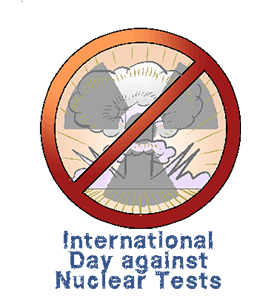August 29: International Day Against Nuclear Tests
The International Day Against Nuclear Tests was observed across the world on 29 August with an aim to raise awareness about the effects of nuclear weapon test explosions or any other nuclear explosions.
Observance of the day seeks to promote peace and security world-wide and calls for urgent need to prevent nuclear catastrophes to avert devastating effects on humankind, environment and the planet. It also highlights urgent need for cessation of nuclear weapons as one of the means of achieving the goal of a nuclear-weapon-free world.
To mark this day, various events were organised across the world such as symposia, conferences, exhibits, competitions, publications, instruction in academic institutions.
International Day Against Nuclear Tests
The International Day against Nuclear Tests was instituted by the United Nations General Assembly (UNGA) by unanimously adopting resolution 64/35 in December 2009. The resolution was initiated by Kazakhstan with support of large number of sponsors and cosponsors with a view to commemorate closure of Semipalatinsk Nuclear Test site on 29 August 1991. The Day was first observed in 2010 and since then observed annually to galvanize the necessity of banning nuclear weapon tests.
Semipalatinsk Nuclear Test site
The Semipalatinsk Test Site (also known as The Polygon) was the primary testing venue for the Soviet Union’s nuclear weapons. It is located on the steppe in northeast Kazakhstan (then the Kazakh SSR part of USSR), south of the valley of the Irtysh River. The Soviet Union had conducted 456 nuclear tests on this site from 1949 until 1989 including 340 underground and 116 atmospheric explosions (roughly the equivalent of 2500 Hiroshima atomic bombs) with little regard for their effect on the local people or environment.
Month: Current Affairs - August, 2017


